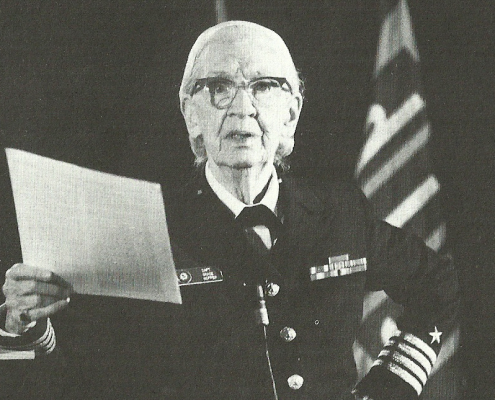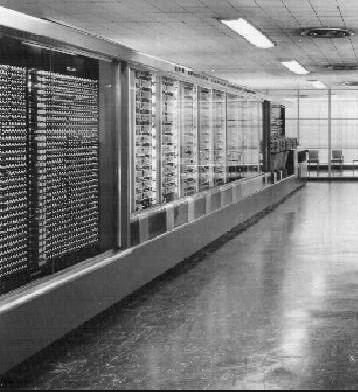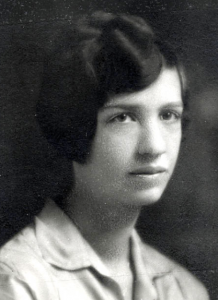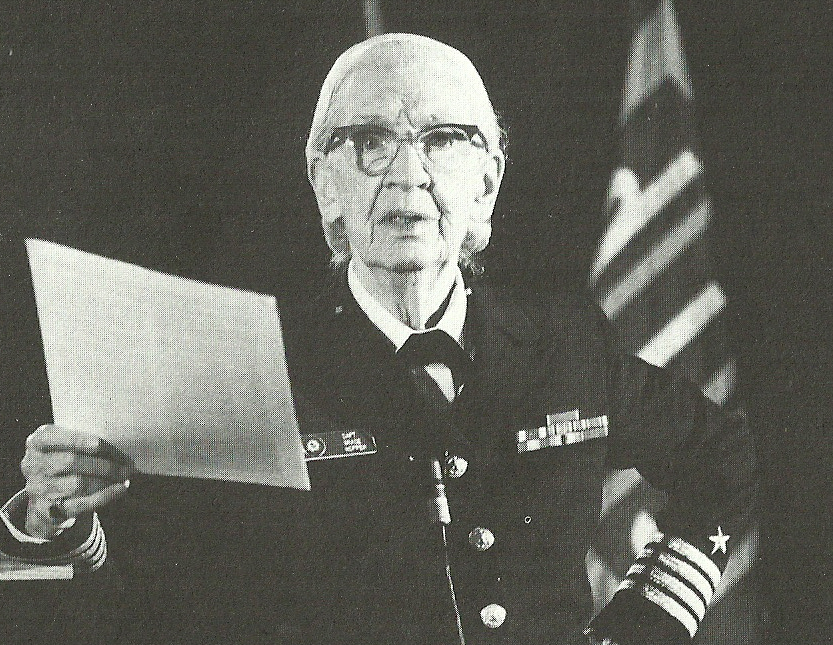Captain Grace Hopper’s Lessons

When Yale decided to rename one of its residential colleges, my college, from Calhoun to Grace Hopper, I was annoyed.
I was used to the old name and had no problem with it. I didn’t associate it with an historical person, anymore than I did Silliman or Berkeley or Morse or Pierson. When I was there, the historical figure was never mentioned. There was no statue, no painting. It was just a name.
Then I remembered that I had met Captain Grace Hopper, had heard her deliver a speech, and had written an article about her back in 1983, when I worked for DEC, the minicomputer company.
She was short, frail, and feisty. (She came to my chin, and I’m not tall). She was grandmotherly, but no-nonsense. By her very presence, she commanded respect. She reminded me of Margaret Meade delivering her lectures in Woolsey Hall my senior year. Twenty-five years later, I remember three of the anecdotes Captain Hopper told back then.
She said that in her office she had a clock that ran counter-clockwise, as a reminder not to take anything for granted, not to presume that the way things have always been done is the only way.
What’s A Nanosecond?
Then she held up a foot-long piece of wire and said that that’s a nanosecond.
Who can imagine a “nanosecond” — a billionth of a second? And who can grasp its importance? But she held it there in her frail hands. And it was the key to technological development.
That’s the distance that light and electricity travel in a nanosecond. And if you are designing a computer system, and you want to make it faster and hence more powerful, you don’t need to invent anything new. You just have to make the circuits smaller. Reduce the size in half and the electricity only has to go half as far, so the circuit will operate twice as fast. With that piece of wire, she made the past and future of computer technology tactile, immediate, unforgettable.

(courtesy of Computer History Museum)
Then she talked about working on one of the earliest computers, the Mark I, during World War II. She said, “It was 51 feet long, 8 feet high, 8 feet deep, in a magnificent glass case.” In those days the power of today’s cellphone was only imaginable in science fiction set hundreds of years in the future. But in its day, that computer was unique and amazingly powerful. As she said, “It was the first tool that assisted the power of man’s brain instead of the strength of his arm.”
One day it stopped working, and no one knew why. By theory, by everything that was known in that day, the failure made no sense. So she went into that glass-encased room and took a look. This was before the days of cathode ray tubes, much less integrated circuits. The guts of the machine consisted of a series of mechanical switches. And one of those switches had closed on and crushed a moth. She took out the moth, and the computer worked again. She then taped the moth in her log book and entered, “Bug found.” That’s the origin of the expression “a computer bug.”
So thinking about the name change led me to dig up the article I wrote about her and post it on my web site (at http://www.seltzerbooks.com/
But still, it feels strange for Calhoun to be renamed for a computer pioneer, given that, when I was there, computers were in their infancy, and I had never seen one, much less used one, and there was no Computer Science major (at least as far as I knew).
Little did I know then, as an English major, that I would spend most of my working life at DEC, the world’s second largest computer company. At Yale, I wrote about Dryden’s heroic drama. But when I got a job, I ended up writing about technology. And the technology I wrote about changed the world we live in. And now, just a few decades later, that technology and that world feel ancient and obsolete.
I can’t help but imagine that in some Isaac-Asimov-inspired future, after the ultimate battle between humans and robots when (hopefully) robots have been defeated and banned, and computer technology has been demonized as the root of a terrible evil that nearly doomed mankind, Grace Hopper College will be renamed — perhaps Asimov College.
Name changes can serve as wake-up calls, making us realize that the world has changed and that we have changed as well.
* * * * * * * * * * * *
A Changing World

at Vassar
By the time I met Grace Hopper, in 1983, just 14 years after graduation, the Viet Nam War was a distant memory, business was booming, and computers were transforming business and society. Business computers and home computers and videogames. And I found myself making a living writing about technology that hadn’t existed when I was at Yale studying English literature.
Then turn the dial forward another 14 years, to 1997, and the high tech products and the business principles of 1983 were obsolete. The Internet connected everybody to everybody, giving rise to new business models and life styles. DEC wasn’t changing fast enough and was on the brink of demise. And my job there had changed. Now my title was “Internet Evangelist,” and the company was sending me around the world to deliver my message that in industry after industry the business dynamics were changing, opening new opportunities and presenting new risks and challenges. I was preaching that businesses needed to adapt rapidly, while, ironically, the company that was paying me to deliver that message didn’t heed it. With no technical education whatsoever, I found myself in the position of writing books about the Internet and being considered an expert in a field that hadn’t existed 14 years before. And that year, my oldest son, Bob graduated from Yale. (He, too, was in Calhoun). And his major was molecular biophysics and biochemistry, a field that didn’t exist when I graduated.
Click forward another 14 years to 2011, and I was making a living as a publisher of electronic books — a kind of business that hadn’t existed before. My company consisted of just me and my wife, Barbara, with occasional help from two of our sons. We took classics of literature and history, works old enough to be in the public domain, and put them in formats readable on handheld devices, and sold them through massive online stores like Amazon’s Kindle and Barnes & Noble’s Nook. I was publishing works that I once studied at Yale. I was doing an electronic equivalent of the Modern Library, with a few PCs, working out of our basement. When my youngest son started college the next yet, majoring in East Asian Studies, one of his textbooks was a book that he had converted into an ebook the year before.
Now, just seven years later, that business is obsolete, that market having been flooded by competitors. Works that had been profitable to publish electronically before are now readily available in the needed formats for free. My children are all living their own lives. Barbara, my wife of 39 years, died six years ago. And I find myself reading books I should have read back in college and writing books that will never be published and going out on Match dates.
This is a world in which everyone connects to everyone else with cellphones, with apps that work in ways that challenge my not-so-nimble fingers. And I have much to learn to keep up. New challenges. New opportunities. The world is a kaleidoscope. Adapt and enjoy.
Yes, the world has changed, and I have changed as well. When I met Grace Hopper, she was a little old lady, older than my grandmother. She was an ancient 77. Now I’m 72, and some of the women I meet from Match don’t look much different than she did then. And I probably look elderly to them.
So what does all this mean, having lived through four transformations of business and society?
I’ve grown to appreciate the value of a liberal, non-career-oriented education. Rather than focus on learning what was needed for a single career that would soon become obsolete, I learned how to learn and how to think critically. I learned to look at complex subjects in a simple concrete way, rather than being intimidated by what I, at first, did not understand. And some of Grace Hopper’s words and gestures from a single speech back in 1983 still resonate with me.
To make a computer that works twice as fast, make it twice as small. And if something unexpected screws up your complex creation, don’t rely on theory and diagnostic programs. Rather, take a close look without the bias of preset ideas, and maybe you’ll find something unexpected, like her moth, something that you too could tape in a log book and call a “bug”.
One suggestion about the renaming: her Navy title was important to her. She wasn’t “Grace Hopper”. She was “Captain Grace Hopper.” She ended her speech 25 years ago, “I’ve had such a happy time the last 15 years. It’s been busy, challenging. I have loved every minute of it. I have also received most of the honors that are given to anyone in the computer industry. Each time I have received one, I’ve thanked them, then told them, as I tell you: I have already received the highest award I will ever receive, no matter how long I live, no matter how many more jobs I have. And that has been the privilege and responsibility of serving very proudly in the United States Navy.”
If you wish to honor her, give her back her title, make it “Captain Grace Hopper College.”


Great history, Richard. You slyly gave us an engaging history of yourself as you were addressing Captain Grace Hopper. I like the way you’ve come out, in your advanced years, for the value of a general “liberal” education. I admire that, and yet I have come out the opposite way. I find myself appreciating the practical, applied aspects of my eduation, and I find myself advocating it to my children/grandchildren. I was an Administrative Science major with a technical leaning. I enjoy calling myself an “industrial engineering” graduate, and engineering seems the most attractive of university majors that I would consider today… were I to be a young student again. Thanks for your well crafted post here.